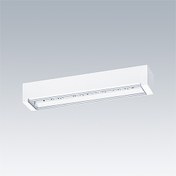Voyager One / VOYAGER ONE MS ANT ECC WH IP65
96631599
▶Change configuration
- Base: 96631599 — VOYAGER ONE MS ANT ECC WH IP65
▼ Data Sheet
Slim IP65 LED emergency lighting luminaire for surface, wall or ceiling mounting; Click adapter for wall surface mounting within scope of delivery; recessed ceiling mounting possible with optional recessed ceiling frame; Luminaire for central emergency light supply, with circuit monitoring, without single monitoring of the luminaire; ; ; additional click-optics optimised for escape routes and open areas from higher mounting heights available; Click in legends for viewing from a maximum distance of 23 m and 30 m available to convert to escape sign luminaire; housing made of polycarbonate white; cover mode of transparent polycarbonate; Tool-less 'click' mounting after fitting the housing base; Quick fit terminal block, through wiring possible up to 2,5 mm²; zero maintenance thanks to LED technology; service life of 50,000 h at constant luminous flux; Power supply: 220/240 V AC; Luminaire input power: 4 W; degree of protection: IP65, class of protection: SC2; Impact strength: IK03; Dimensions: 336 x 54 x 59 mm; weight: 0.4 kg
- LED
- CE
- IK03
- IP65
- SC2
- Ta-10-40
- UKCA

